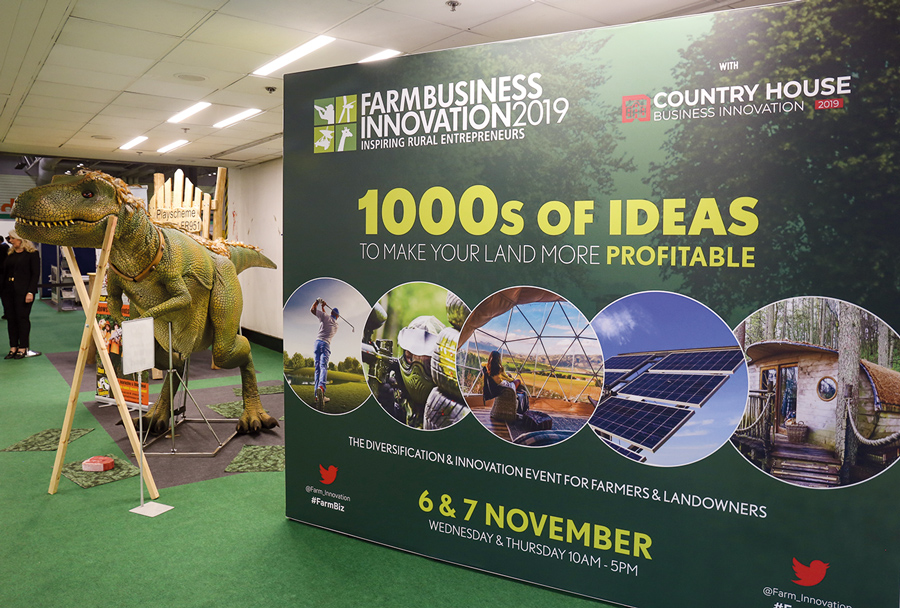Breathing new life into British farms
1st January 2020
As farmers battle a set of unique and complex challenges, the trend for branching out into new revenue streams, outside of traditional farming, is becoming increasingly important.
In a world of rising energy costs, falling food prices and political uncertainty, the realities of farming can be harsh. But true to the ‘Keep calm and carry on’ spirit, more than 64 per cent of English farms have risen to these challenges by diversifying into new business ventures. Sarah Kidby reports.
As farmers battle a set of unique and complex challenges, the trend for branching out into new revenue streams, outside of traditional farming, is becoming increasingly important. Defra figures suggest the total income from farm diversification was £580 million in 2015-16, and it is estimated that such activity brings in an average of £10,400 extra revenue per UK farm, so it is a venture well worth considering. The recent Farm Business Innovation Show (7-8 November) in Birmingham presented an Aladdin’s cave of ideas for giving your land a new lease of life.
What are the options?
The opportunities for diversification seem almost boundless – from the more established ideas, such as setting up a glamping site, renting out holiday cottages or opening up a wedding venue, to the more unusual, including truffle cultivation, wildlife seed production and Christmas trees. Meanwhile, the craft beer revolution has seen the number of microbreweries in the UK reach more than 2,000 – a 64 per cent rise compared to five years ago, according to figures from accountancy firm UHY Hacker Young.
There are also options for diversification within agriculture, such as fish farming or producing alternative livestock products such as cashmere, goat’s milk and venison. Many dairy farmers are generating extra income through ice cream and cheese production, as the rapidly falling price of milk puts a serious strain on the industry.
Environmental issues rising up the agenda brings opportunities as well as challenges, and farmers are uniquely placed to deliver public goods and be rewarded for them.
This includes providing areas for wildlife to thrive and generating renewable energy on farm. Forestry could be another area of growth,
with the rising market demand for biomass heating systems, and there are government grant schemes for felling and replanting.
Many farmers are delving into multiple business streams – for example, Lynn and Richard Bailey, of Bawden Lodge Farm in Leicestershire, spoke at the Innovation Show about their experiences transforming their farm buildings into a business community. The pair developed a solar energy source, became part of the National Forest Tender Scheme, set up an award-winning wedding and events business and installed their own on-site gin distillery – all the while continuing to farm.
As well as growing your business and bringing in more revenue, diversification offers a real opportunity to connect with the local community. A rising number of farms are now opening up to the public for classes in cheese-making or fish smoking, for example, and ‘care farms’, which provide support and resources for vulnerable people in society, are growing in popularity.
The practicalities
Thinking about fresh ideas for a new business can be exciting, but there are, of course, many practical issues to consider. As with any new business venture, it is important to be aware of the legalities and potential pitfalls, such as planning permission, property law, liability, health and safety and tax issues, for example. While diversification can be rewarding, both financially and personally, it is not guaranteed to boost income.
Before embarking on a new business idea, AHDB says you must first ensure your existing enterprise is running smoothly, meeting the targets set out in your business plan and on target for profit and loss projections. Diversifying when there are issues in your main business could just magnify the problem, putting both businesses at risk. If you do decide to go ahead, create a business plan, research your competition and consider products, pricing and marketing. It is important to take your time, make sure the demand for your product is there and that you can make a profit. Expert advice and guidance are always a good idea when thinking about the future of your business or any potential diversification.
It is wise to play to your existing skills and strengths when setting up a new business. If you are entering into new territory, real estate agency Strutt & Parker says you will need to either retrain yourself so you have the necessary skills and knowledge, or hire someone with the right skills. Lack of infrastructure such as road access, broadband and mobile services can also be a problem with some businesses, so it is important to think about what you need and the costs involved.
In addition to these considerations, you should bear in mind that different rules and regulations may apply to your new business, for example health and safety or employment issues. You will also need to speak to your local council to see if planning permission is required.
Last but certainly not least is the question of securing funding, which according to estate agency Carter Jonas, is one of the biggest challenges for those considering diversification. Options recommended by Defra include the Rural Development Programme for England (RDPE), or commercial loans and overdrafts.
Community on the farm
Suffolk farmer Alastair Sharp says he feels it would be difficult to have a viable farm tenancy without diversification. He took over tenancy of the family-run farm from his father in 1996 and began diversifying with the landlord’s co-operation when beef cattle sheds became redundant.
The arable farm now has three main tenants – the Star Wing Brewery and Tap Room, Professional Poultry Solutions and the English Electric Motor Co. Multiple businesses are involved in the site, including a bakery, locally-made ice cream, an outdoor theatre, off-road demo course and hop-growing. Events such as the annual beer festival, hop-picking days and Christmas Fair can bring in more than 500 people at a time.
Alastair says: “It has completely changed the nature of the farmyard, with members of the public visiting, but once that is accepted and embraced the diversifications continue to go from strength to strength. The farmyard now employs at least 20 people and, without diversification, it would be none – so it’s better for the local community, too.
“As a farm business it is also good to have income unrelated to cropping and the weather,” he adds. “It has been a challenge at times but the end result has been worth it.”
However, it is essential to have an understanding landlord who is prepared to work with you, he says.



